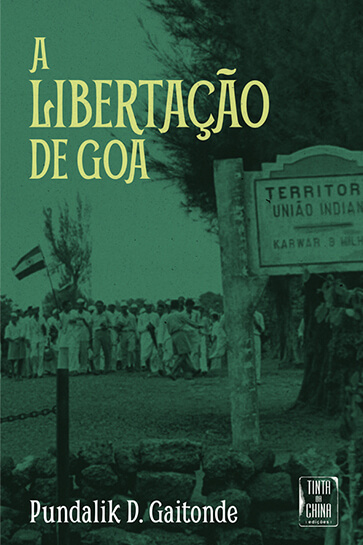
Prefácio
Aug 19, 2018 | Other publications, Publications

Prefácio
- Fernando Rosas
- A Libertação de Goa
- Pundalik D. Gaitonde (Author)
- 2018
- Lisbon: Tinta da China
- Language: Portuguese
- ISBN: 978‑989‑671‑446‑8
- Pages: 9-20
Excerpt:
A bibliografia disponível em língua portuguesa sobre o pro‑cesso que conduziu à queda e integração na União Indiana dos enclaves coloniais de Goa, Damão e Diu (o chamado Estado Português da Índia) em dezembro de 1961 caracterizava ‑se por observar essa realidade fundamentalmente a partir da Metrópole colonial, do discurso do Estado Novo e do Governo de Salazar, mesmo quando é crítico relativamente a ele.A importância do livro que a Tinta ‑da ‑china agora dá à estampa reside precisamente na inversão da perspetiva: é a primeira edição em língua portuguesa (que eu conheça) de análise da mesma questão, agora vista do lado dos movimentos nacionalistas goeses, defensores da libertação dos enclaves coloniais e da sua integração na República Indiana. Concretamente, pela pena do Dr. Pundalik D. Gaitonde, prestigiada figura de médico cirurgião goês e destacado dirigente do Congresso Nacional (Goa), movimento nacionalista a que presidiu, sendo um dos esteios da resistência anticolonial defensora da integração na «mãe pátria», a União Indiana, independente desde 1947. Por isso conheceria a prisão e a deportação para Portugal, onde estaria detido nas cadeias políticas do regime. A sua prisão pelas autoridades coloniais em Goa, em fevereiro de 1954, levantará uma vaga de pro‑testos e manifestações dentro e fora da colónia, o que obrigará o Governo da União Indiana a reverter a sua política de relativo distanciamento quanto ao problema de Goa, num sentido de maior firmeza e assertividade na defesa dos direitos dos goeses, designadamente contra a dura repressão das autoridades coloniais portuguesas.
About the book:
O que aconteceu no final de 1961, quando as regiões de Goa, Damão e Diu, contra a vontade de Salazar, foram libertadas por tropas indianas? De que forma os goeses lutaram desde que as forças britânicas saíram do país e só Portugal continuava atravessado no caminho da Índia rumo à unificação? Qual o impacto deste movimento nas lutas de libertação das colónias africanas?
Se alguém pode responder a estas questões é Pundalik D. Gaitonde, um dos protagonistas da luta contra a ocupação portuguesa da Índia, conselheiro de Nehru, activista e, de acordo com a perspectiva de Portugal, um rebelde condenado.
Other publications
Search
Events
julho, 2025
Tipologia do Evento:
Todos
Todos
Colloquium
Conference
Conference
Congress
Course
Cycle
Debate
Exhibition
Launch
Lecture
Meeting
Movie session
Open calls
Opening
Other
Presentation
Round table
Seminar
Showcase
Symposium
Tour
Workshop
- Event Name
seg
ter
qua
qui
sex
sab
dom
-
1
2
3
4
5
6
7
8
9
10
11
12
13
14
15
16
17
18
19
20
21
22
23
24
25
26
27
28
29
30
31
Não Existem Eventos
News
Statement about the demolitions in the Bairro de Santa Filomena
Jul 3, 2025
Statement from the team of the project FILMASPORA
VINCULUM recognised with European Union Prize for Citizen Science
Jun 20, 2025
VINCULUM’s application received an Honourable Mention in the European Union Prize for Citizen Science 2025
IHC-APIGRAF book receives editorial design award
Jun 16, 2025
The book on the history of the national printing industry was the Gold Winner in the Editorial Design — Book category.
CONTACTS
WORKING HOURS

































































































































